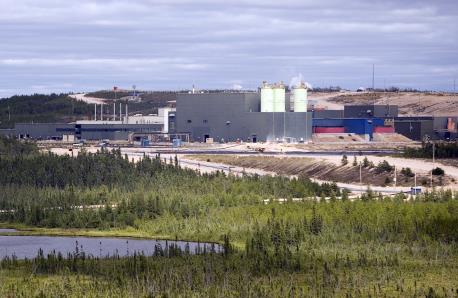Canada's two operating uranium mills must complete a series of actions to review lessons learned from unplanned releases of uranium dust at the Key Lake mill earlier this year.
 |
| Cameco's Key Lake mill in northern Saskatchewan (Image: Cameco) |
Two releases of calcined yellowcake - the final product of the mill - occurred in separate events at Key Lake in January and February. In both events, workers were exposed to calcined uranium product, although their exposures were well below regulatory limits. No uranium was released to the environment, and the Canadian Nuclear Safety Commission (CNSC) approved the steps taken by mill operator Cameco to identify and correct the sources of the dust. Production was suspended for several days while inspections were completed.
The CNSC has now written to Cameco and Areva instructing them to review initial lessons learned from the Key Lake events and re-examine the safety cases for the design and operation of each mill's yellowcake dryer/calciner and ancillary facilities. The review is to focus on the design and operation features intended to prevent an unplanned release of yellowcake into the work environment; equipment, processes and procedures to monitor and identify any weakening of containment systems; radiation monitoring equipment and procedures that will quickly identify any unplanned releases of yellowcake into the work environment; and reporting on corrective actions and implementation schedules for measures to address any significant gaps.
In its letter to mill operators, the regulator said that while it was satisfied with the immediate actions taken by Cameco "we are concerned by the similarities between the events and want to ensure that such events are effectively prevented or mitigated through a lessons learned approach at all operating uranium mills".
The regulator has asked for all operating mill facilities - that is, Cameco's Key Lake and Rabbit Lake, and the JEB mill at McClean Lake, operated by Areva - to complete the actions by 30 April.
Cameco spokesman Gord Struthers told World Nuclear News that all the measures requested by the regulator are already being completed at Key Lake as part of the company's investigation and response to the initial events in January and February. The company will have to complete a review of the Rabbit Lake mill in order to prepare a response, he said. Production is not expected to be affected. "By this action, the CNSC is taking steps to ensure that the drying processes at all Canadian uranium mills are safe for workers," he said.
Researched and written
by World Nuclear News














